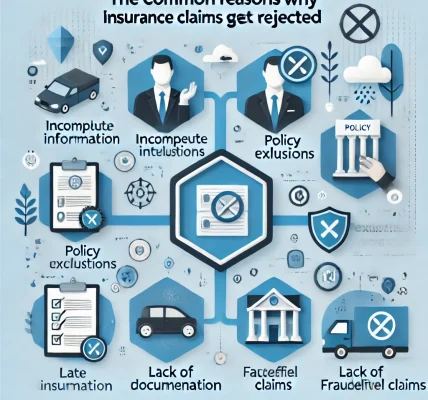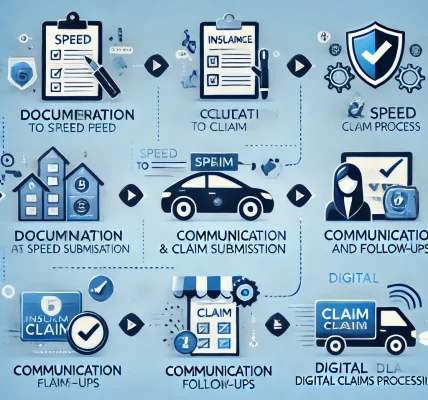The insurance industry is undergoing a digital transformation, with artificial intelligence (AI), automation, and advanced digital processes reshaping how claims are handled. This evolution is making claims processing faster, more efficient, and less stressful for policyholders while improving accuracy and reducing fraud. In this article, we explore how AI, automation, and digital advancements are revolutionizing insurance claims and what it means for both insurers and customers.
1. The Role of AI in Insurance Claims
Artificial intelligence is at the forefront of innovation in the insurance sector. AI is being used to streamline claim processing, detect fraudulent activities, and enhance customer service. Here’s how:
a. AI-Powered Claim Assessment
- AI algorithms analyze claim details, supporting documents, and past cases to assess claims quickly and fairly.
- Image recognition technology evaluates photos of damages, such as car accidents or property destruction, to determine compensation faster.
b. Chatbots & Virtual Assistants
- AI-driven chatbots handle initial claim inquiries, guiding customers through the filing process and reducing the need for human intervention.
- Virtual assistants provide real-time updates on claim status, answer FAQs, and even offer personalized policy recommendations.
c. Fraud Detection
- AI identifies unusual patterns in claims that might indicate fraud, reducing losses for insurers and ensuring fair payouts for genuine claims.
- Predictive analytics flag suspicious claims by comparing them with historical fraud data.
2. Automation in Claims Processing
Automation is revolutionizing insurance claims by eliminating manual paperwork, reducing errors, and speeding up processing times. Here’s how automation is changing the landscape:
a. Straight-Through Processing (STP)
- Many insurers are adopting STP, where claims are automatically approved and paid out without manual intervention, provided they meet pre-defined criteria.
- This significantly reduces the turnaround time for claim settlements.
b. Robotic Process Automation (RPA)
- RPA bots handle repetitive tasks like data entry, policy verification, and claims validation, increasing efficiency.
- By automating routine processes, insurance companies free up human resources for complex cases requiring personal attention.
c. Smart Contracts & Blockchain
- Blockchain technology ensures transparency and security in claims processing.
- Smart contracts enable automatic execution of claim settlements once predefined conditions are met, reducing disputes and delays.
3. Digital Processes Enhancing Customer Experience
Insurance companies are leveraging digital solutions to improve the customer experience and make claims processing more seamless.
a. Mobile Claims Filing
- Customers can now file claims via mobile apps, upload supporting documents, and receive instant updates.
- Many insurers offer self-service portals where users can track claims in real-time.
b. Remote Damage Assessment
- Insurers are using AI-powered tools and drones to assess damage remotely, reducing the need for in-person inspections.
- Policyholders can submit photos and videos of damages, which AI evaluates to determine claim validity and estimated payouts.
c. Personalized Digital Communication
- AI-driven analytics offer personalized claim handling by understanding customer history and preferences.
- Insurers use automated emails, SMS alerts, and push notifications to keep policyholders informed throughout the claim process.
4. The Benefits of AI, Automation & Digitalization in Insurance Claims
a. Faster Claims Processing
- AI and automation significantly reduce the time required to assess, validate, and process claims, leading to quicker payouts.
b. Enhanced Accuracy & Reduced Errors
- Automated data validation minimizes human errors, ensuring accurate claim settlements.
c. Cost Efficiency for Insurers & Policyholders
- Automation lowers operational costs for insurers, which can translate into lower premiums and better services for customers.
d. Improved Fraud Prevention
- AI and blockchain technology enhance fraud detection capabilities, ensuring fair claim settlements.
e. Better Customer Experience
- Digital platforms provide convenience and transparency, making the claims process less stressful for policyholders.
5. Challenges & Considerations in Adopting AI & Automation
While the benefits of AI and automation in insurance claims are immense, there are some challenges to consider:
a. Data Privacy & Security Concerns
- Handling sensitive customer data requires robust cybersecurity measures to prevent breaches and ensure compliance with regulations.
b. Resistance to Change
- Some policyholders and insurers may be hesitant to embrace digital claims processing, requiring proper education and awareness initiatives.
c. Dependence on Technology
- Over-reliance on AI and automation may lead to gaps in human judgment, especially in complex claim cases requiring personalized evaluation.
6. The Future of Insurance Claims Processing
Looking ahead, the insurance industry will continue to evolve, with further advancements in AI, automation, and digitalization. Key trends include:
a. Expansion of AI-Powered Claims Handling
- AI will continue to refine its ability to assess claims, reducing manual intervention and increasing efficiency.
b. Blockchain for Transparent Claims Management
- More insurers will integrate blockchain to create secure, tamper-proof claim records.
c. IoT (Internet of Things) for Real-Time Data Collection
- Connected devices (such as smart home sensors) will provide insurers with real-time damage assessments, improving claim accuracy.
Conclusion
The future of insurance claims lies in AI, automation, and digital processes. These technologies are streamlining claims handling, reducing fraud, and improving customer experience. While challenges remain, ongoing advancements will continue to make insurance claims faster, more transparent, and customer-friendly.
As insurers adapt to these innovations, policyholders can expect a more efficient and hassle-free claims experience. Understanding these changes and embracing digital tools will be key to making the most out of future insurance claims processes.




